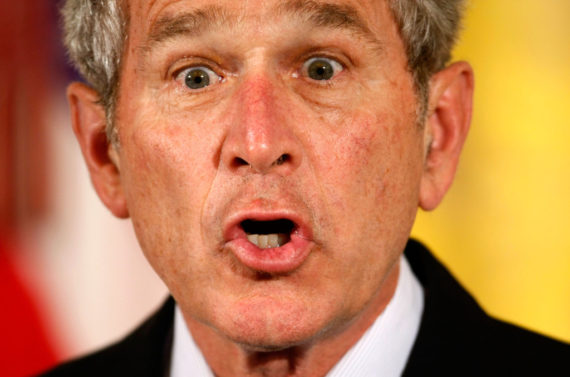An American president can wreck his country and blow up the world, but he cannot recreate either of them.
—Chilton Williamson
A recent book on the George W. Bush presidency is called A Tragic Legacy. But tragedy suggests the fall of something high and noble. There never has been anything high and noble about Bush. His career began as low comedy and ends as bloody farce.
How many killings does it take to make a war criminal? Is ignorance and incompetence a defense?
Nothing is so easy and gratifying as spending other people’s money—especially if you are praised for your good works—and get a cut yourself. This is the long-established cynical practice of Congress. But with Bush one has the sense that it is something else. In his own universe, which he mistakes for the world, he has no experience with the consequences of over-spending and debt. Consequences of any kind have little reality for him. Moral responsibility is not part of his universe.
Shopping is the great American pastime. Everyone likes to participate whether they are good at it or not. One of the high points of George’s reign was when, just after catastrophic terror attacks, he urged his fellow countrymen to comfort themselves by shopping.
Or perhaps the highest point came when it was pointed out that Al Queida was not a problem in Iraq until after his invasion. Showing the pungent truthfulness and courageous spirit of the true patriot and statesman, Bush responded: “So what?”
Can you imagine a post-emperor Bush? Here is a man who has never done anything worthwhile, who has never done a single thing to serve his fellow man before or during his public career. What is such a man to do now?
If Americans learn nothing else from the Bush fiasco, assuming they are able to learn anything, it should be never again to elect a spoiled brat to high office.
Perhaps George’s most lasting “accomplishment” is the discrediting of Christianity as a political force in America. It is assumed that his strongest support came from “evangelicals,” with whom he pretended kinship. Liberal commentators like to imagine that Christians conspire to impose a puritan reign of terror on the country, and so pundits and historians will continue to write about the evil domination of the Bush administrations by Christians. But of course, this is to misstate the facts, as usual.
The fact is that the Republican party has always dictated to the organised “evangelicals” but they have never dictated any Republican act or policy of significance. In the 1960s George Wallace showed the vote-getting potential of the “social issues,” something which no Republican had the insight or daring to do. But the party did see the potential votes from “silent majority” rhetoric. And so the “leaders” of the organised “evangelicals” were seduced by pretenses of fellowship and shared values. For the most part, those “leaders” were people of such shallow intellect and character that once allowed to actually meet a President they were enslaved for life. They wanted more than anything what too many Americans want—superioir respectability and status within the herd. (Both Tocqueville and Solzhenytsin observed that this is a predominant aspect of American behaviour.)
But, of course, the Republican politicians generally hold in contempt the Christian groups and their concerns, a minor distraction from their pursuit of power and profit. They have had zero impact upon Republicans in power. The last believing and practising Christian in the White House was Jimmy Carter. Given the disgrace brought down on the faith by Bush, there will probably never be another.






